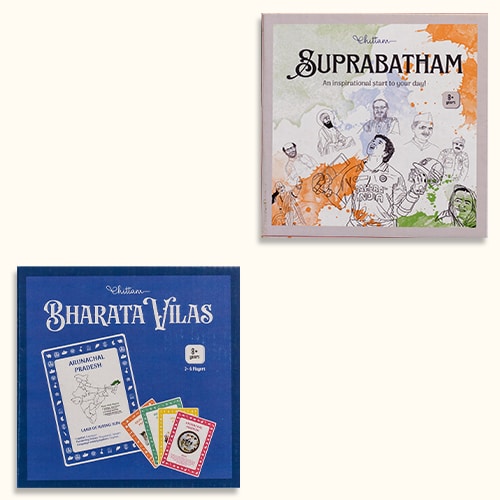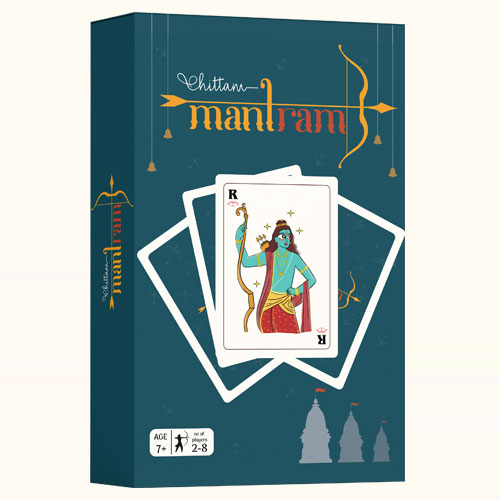
“I asked a group of school children where their source of drinking water was. Many responded with answers like, “our RO machine,” and “the water tanker,” and so on. Not one could name the lake or river from which their water was captured. I was not shocked, but very disappointed that these children have absolutely no knowledge of their surroundings, the geography, and the connected history of their land,” recalls Charanya Kumar, the effervescent CEO of Chittam, a company that is seeking to connect children with their ancient Indian cultures, values, and learnings.

Charanya, a native of Chennai with a Master’s in Computer Science from the UNC, Charlotte, had specialised in game design. But at the height of the 2009 recession, it was difficult to find a foothold in the gaming industry. She then began working for IBM in program management, bounding up the ladder in a short time. “But that wasn’t for me! Just as everything was falling into place—even my green card process was in the last stages, I decided to shake things up,” she laughs. Charanya went on to complete an MBA from INSEAD in Paris and Singapore. Employed with Wipro in a global leadership rotation role, it was back to traveling for her.
“In 2017 my husband and I felt it was time to put down roots, and we scuttled back to Chennai – no surprise there!” she shares. By this time, she wanted to mix things once more, and with her spouse’s support, she ventured into learning and development. She put herself through stints in skilling, rural education, and studying of supplementary education imparted to urban underprivileged children through a non-profit organisation.

As she was learning from these experiences, one thing that struck her was how commonly the words “stressed” and “depressed” were used by the students. It was apparent that most of these students were trying escape mechanisms rather than being able to cope with challenges. “As someone who is rooted to the stories and scriptures I learned while growing up, I always return to re-read and contemplate on the lessons they reinforce, when I hit a low patch,” she says. “And if you notice, our puranas and ithihasas are full of grey shades — you can find new answers to your questions.”
Charanya delved deeper into this line of thought. As part of her research she spoke with the Director of IIT, Chennai which was reeling under a spate of student suicides that year. The Director shared a study that was initiated (but never saw completion), which explored the hypothesis that students who had been exposed to Indian scriptures and stories from their connected families were less prone to suicidal thoughts than those that came from nuclear metro families.

“It reaffirmed my belief that connecting these students to their own family history, and our Indian history’s richness would provide them a fabric of resilience that they severely lacked,” she says. “One of my own grandmothers, who I witnessed growing up, was fiercely independent. She served as an inspiration for many, including me. She had been married off when she was about twelve, and was widowed within six months. Undeterred, she went on to study, earned her credentials and taught for decades till her retirement. And she continued to live independently till the day she passed on. Where did she find this resilience? What was the source of her strength and inspiration? Could it be stories shared within the family…something that’s completely lost to the modern child?”

The stars aligned—Charanya’s game design skills, her deep exposure to the scriptures and history, and her learnings from the various stints she did, all helped her converge on an idea—a gaming products company that made it fun yet educative for children of all ages (even senior citizens) without it becoming a tedious learning session. “These children are shuttled between various classes and programs, and the last thing they want is another learning chore,” laughs Charanya.
Early 2023, she launched Chittam with five products, and worked with schools, pop-up barns, and teachers to spread awareness. The core team has grown to seven now, with a completely remote talent base—from Chennai to Jamshedpur, Bangalore and so on. “We invest heavily in mentors, who bring experience and are also acknowledged experts on the subject of our game—for example, an ayurvedic practitioner guided our game design for ayurvedic experiences,” recounts the founder.
The team—some recruited fresh from tier 2 colleges—bought into the idea of bringing rich history into quirky games, and are encouraged to try out the most impossible of ideas. “We have no baseline challenges, so everything is possible,” she laughs. The Chittam team then focused on finding the right customers. Focus groups and urban schools were excited by the product ideas and a couple of expats were keen on helping them launch abroad. “Clearly, we are interested but not ready,” she responded. That didn’t stem their friends’ enthusiasm. They reached out to their network and collectively donated a few hundred dollars to take Chittam games to children in rural Tamil Nadu.
The initiative led to deep customer experience learning especially from teachers in government schools who provided rich feedback. “While we can optimise and scale our manufacturing, I want to spend sufficient time first fine-tuning, changing, and if necessary completely redesigning each game to ensure it meets its objective,” says Charanya. “Learning from the customer early on will help us avoid mistakes later.”
The pop-up stores were another source of incredible learning. “We watched our prospects just a foot away from us, as they interacted with our products quite intensely – studying the quality, the art and the experience,” recalls Charanya. “Children are quite brutal; they can tell you to your face if something is not working for them.” She is already into the third iteration for two of the games. “I need these to be explained in under 30 seconds. The feedback we want to hear is, “Oh, I love this game,” instead of, “This is great content.”
Charanya Kumar is gearing up for 2024 with great optimism—launching a game every quarter, scaling sales, and expanding to global markets. “There is inspiration in every line and chapter of our scriptures, and we are just touching the tip of the iceberg,” she declares. “Our goal is become the go-to place for our children to grow as we connect them to this richness. And we’re happy that it’s already happening!”





